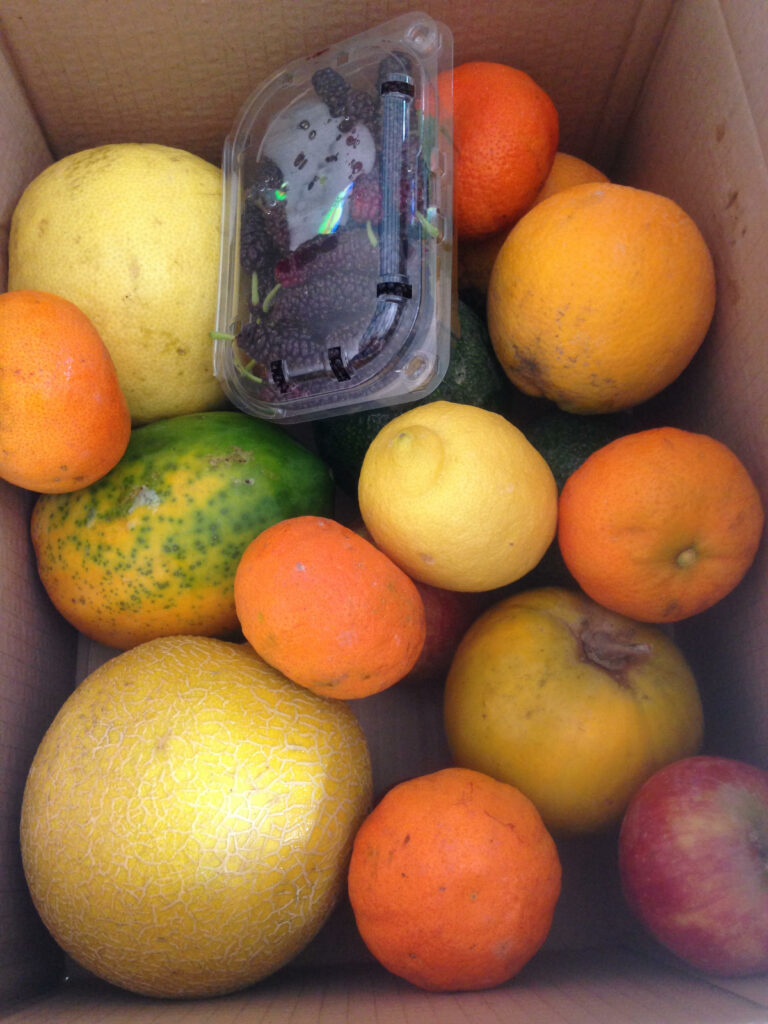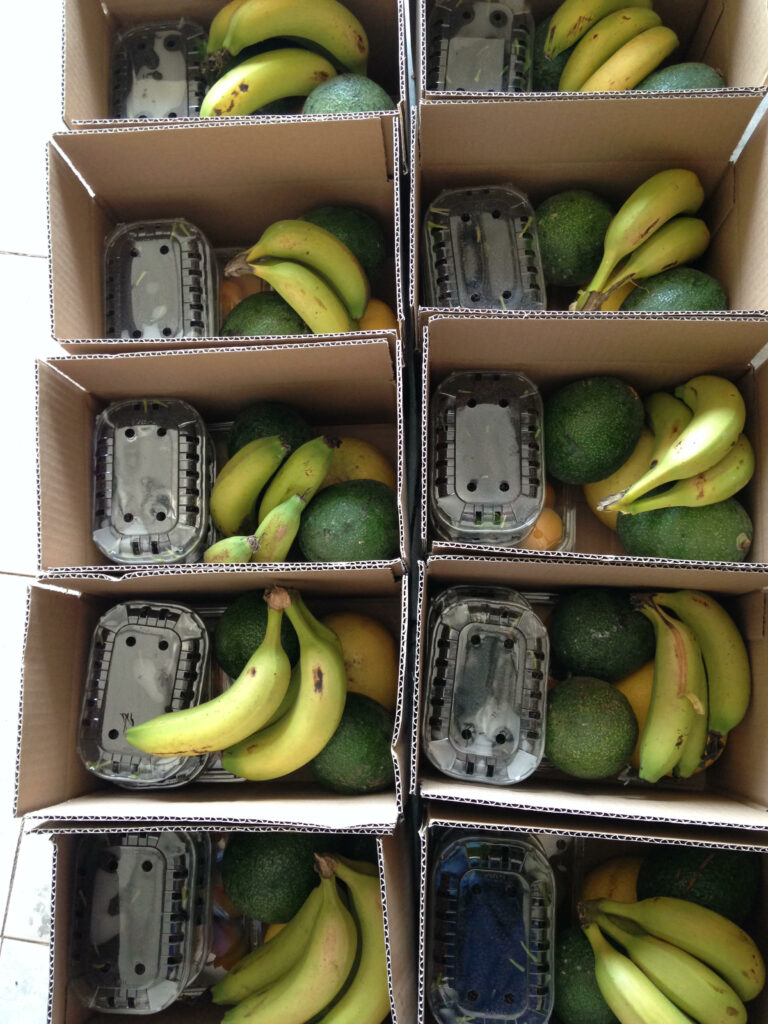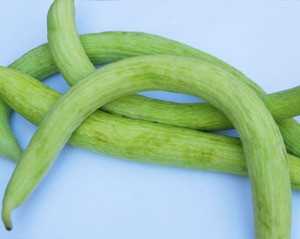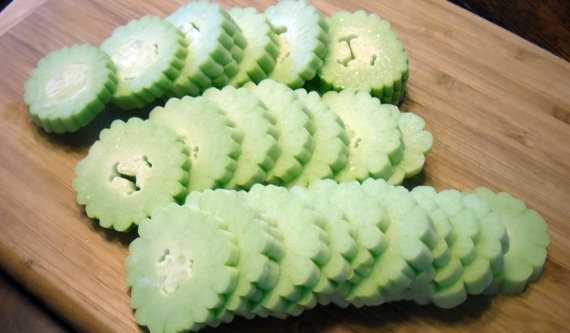In Preparation for Shavuot
Shavuot falls on Sunday next week, and Monday deliveries will go out as usual (May 25). However, in order for us to prepare our documentation in advance for harvest day, the order system for Monday will close on Thursday May 21 at 9:00 PM. Any changes or special requests must arrive by then. We will not be able to accept late changes.
Wednesday deliveries and orders are as usual.
Thank you for your cooperation, and chag sameach!
__________________________
How does one harvest the first fruit: he walks into the field, sees the new fruit of a fig, the new fruit of a cluster [of grapes], the new fruit of a pomegranate – he ties them up in a bundle and announces: these are the new fruits.
(Tractate Bikkurim)
In Helaf’s garden at Melo Hatene in Karmei Yosef, more and more new fruits are ripening to create fruit boxes that are beautifully fresh, new and colorful. The boxes abound with nectarines, apricots, loquat, raspberry, papaya, strawberry, avocado, morus, clementine, Surinam cherries, and canistel, and the first figs are on their way! Helaf’s magnificent fruit boxes also include apples and bananas from other local organic fruit farmers.
Add a delicious variety of fruit to your vegetable order: a large box (4-5-6 types of fruit) costs 86 NIS, while a small box (3-4 types) is 55 NIS.
Happy Holiday of New Fruit!
_________________________
The New Fruit of Fakus
Last week, (nibbling away) we harvested our first fakus beds. I know that I will soon be getting phone calls claiming that “this week I received two portions of zucchini and no cucumbers.” But before you’re tempted to phone, I suggest using the test I learned from Tzipi of Jerusalem (and it’s so simple, of course): the fakus’ stem resembles that of a cucumber, not zucchini! If you received a light-colored elongated vegetable you cannot define, check out its stem (the part where it attaches to the plant): if it is wide and star-shaped like a zucchini, well… it’s a zucchini. If it’s thin and willowy like a cucumber, then say hi to our friend the fakus.
Here, ladies and gentlemen, is The Fakus in all its glory:
Tiberius Julius Caesar Augustus was known for his fondness for cucumbers. He would eat cucumbers every day of the year, necessitating the Roman farmers to develop artificial methods to grow the vegetable year-round. According to The Natural History of Pliny, by Pliny the Elder (Book XIX, Chapter 23), “Indeed, he [Tiberius] was never without it; for he had raised beds made in frames upon wheels, by means of which the cucumbers were moved and exposed to the full heat of the sun; while, in winter, they were withdrawn, and placed under the protection of frames glazed with mirrorstone.”
However…
Tiberius was probably not munching on the cucumber we all know and love, i.e., the Cucumis Sativus, but rather on the light and somewhat hairy fakus, aka Armenian cucumber, which is actually… a melon. Also coined the “snake melon,” in botanical terms this is the Cucumis melo var. flexuosus melon. However, we do not let the fakus mature like our melons—we pick it in its crunchy sweet youth, like the cucumbers (which is a good thing, really, because the fakus just wouldn’t ever become a real tasty melon at full maturity).
There are all sorts of fakus varieties: light green, striped, long and curved or short and light. At Chubeza we grow two types: the small fakus (about the length of a cucumber), and one which is long and curved, resembling its English name “snake melon.”
Melons and cucumbers belong to the same family, but they are two different entities with diverse characteristics. When you look at the different leaves, you can tell that fakus leaves are rounder and less serrated, similar to their melon brothers. Its taste and appearance are closer to the cucumber, which is why it is easy to confuse the two, but not really: the fakus is not thorny at all. It is covered with soft fuzz and is sweeter and crunchier than the cucumber. However, like the cucumber, it is picked in its youth, before its seeds mature, which is why it is not as soft as a melon.
The fakus sometimes tends to be bitter (like the cucumber.) Various attempts to overcome this bitterness have proven that we must carefully choose the plants whose seeds are to be kept for next year, making certain that they are non-bitter plants. We hope you will not receive a bitter fakus, but to be on the safe side, when you slice them up into a salad, first nibble at the point where the fakus was attached to the plant. That’s where the bitterness begins. If you like what you taste, slice away, straight into the salad bowl. If it’s bitter, take a bite further down. Sometimes the bitterness remains contained at the end.
The fakus is lauded by chefs as part of the trend to return to local, homegrown “baladi” food. It does resemble the cucumbers eaten here in the past, before the arrival of the garden cucumber. Last year we were visited by Dr. Moshe Ra’anan, who has written many articles about plants and animals in the Scriptures. He photographed our nice fakus and wrote a few words about them. I learned from him that during the Mishnaic period there was actually a verb “to fakus” (“לפקס”), related to the ripening of the fakus. Our commentators offered two different interpretations for its definition: 1. the stage at which the fuzz is shed from the fruit 2. the stages at which the flower dries up and falls from the fruit. Either way, when the fakus’s are fakused, you can place them in your wicker basket, sling it over your shoulder, place the flowers in your hair and join the parade of the first fruits… straight to the kitchen! Because the nice thing about it is that other than to wash, slice, add some salt if desired and joyfully bite into it, the fakus can be preserved, just like a cucumber, producing delicious pickles, and even fried or stuffed like a zucchini. And all this while being …a melon!
Confused? That’s OK, as long as you eat in good health!
Wishing you a Shavuot festival of first fruits abundant with happiness and hope. May we reap in joy and rejoice with family and friends.
Chag Sameach!
Alon, Bat-Ami, Dror, Yochai and the Chubeza team
What’s Joining the Fakus in This Week’s Boxes?
Monday: Zucchini, onions, Swiss chard, tomatoes, carrots with greens/cabbage, potatoes, parsley root, cucumbers/fakus, coriander/dill, lettuce, beets.
Large box, in addition: Leeks/scallions, eggplant/bell peppers, New Zealand spinach.
Wednesday: beets, onions, Swiss chard, tomatoes, lettuce, zucchini, cucumbers/fakus, potatoes, parsley root, dill/cilantro, cabbage/carrots with tops.
Large box, in addition: leek/scalions, eggplants/peppers, New Zealand spinach
And there’s more! You can add to your basket a wide, delectable range of additional products from fine small producers: flour, fruits, honey, dates, almonds, garbanzo beans, crackers, probiotic foods, dried fruits and leathers, olive oil, bakery products, pomegranate juice and goat dairy too! You can learn more about each producer on the Chubeza website. On our order system there’s a detailed listing of the products and their cost, you can make an order online now




